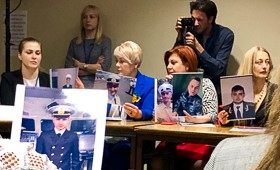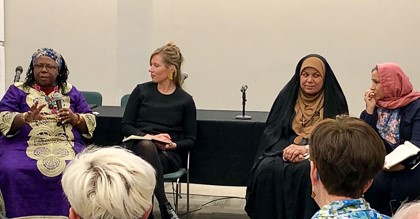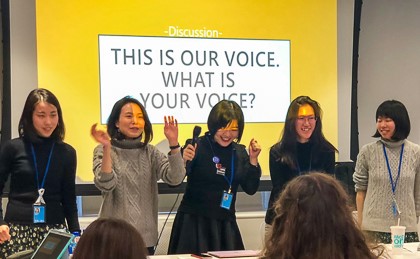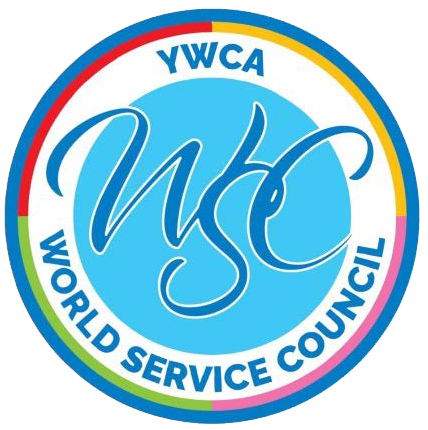Public events at the UN are carefully scripted. Formal statements are delivered by high-level ministers from around the world; internal debate behind closed doors follows. Eventually a document of Agreed Conclusions emerges, which then forms the basis of subsequent deliberations.
This is disrupted once a year when thousands of women from around the world descend upon the UN creating a sensation that reverberates throughout the halls, according to Her Excellency Geraldine Byrne Nason, Ireland’s Ambassador to the UN, and Chair of CSW these last two years. During an informal briefing in February, Nason described last year as a “spiritual experience” that has made her a CSW fanatic. “If you think you are not making a difference, let me tell you that you most definitely do make a difference. This place is not the same after you leave.”
How does this happen? Through a curious admixture of dry, top-down proceedings and soulful, bottom-up, self-organizing groups of women who come together to talk about their lives.
This year’s theme is social protection, access to public services and sustainable infrastructure for women and girls. It ties into SDG 5.4 (Sustainable Development Goals) in recognizing and valuing unpaid care and domestic work. In addition, anticipation of next year’s 20th anniversary of Resolution 1325 on Women, Peace and Security energized many of the discussions. Among the rights set forth in 1325 are women’s involvement in peace negotiations. As women continue to assert their rights to a seat at the (male) negotiating table, they do so knowing that they draw upon a deep well, a universal tradition of engagement, namely, women sitting around a table, talking.
At events large and small, women (and a few men) from around the globe came together and sat in circles to talk. Here are a few snippets of the conversations.
Ukraine
Ukraine sent a group of wives and daughters of Ukrainian sailors who were captured by Russian forces during an assault on the Black Sea in November 2018. It seems quite a long journey for them to come to the UN to talk about family, neighbors and children. Yet here we are, sitting at a table listening to their stories. The moderator asks for our resonance of the heart; even our presence is a sign of solidarity. We witness in silence as the women pass photos of their loved ones around the table. They want us to know that Russia is at war with Ukraine, that it continues, and they do not want to be forgotten.

Ukraine sent a group of wives and daughters of Ukrainian sailors who were captured by Russian forces during an assault on the Black Sea in November 2018. It seems quite a long journey for them to come to the UN to talk about family, neighbors and children. Yet here we are, sitting at a table listening to their stories. The moderator asks for our resonance of the heart; even our presence is a sign of solidarity. We witness in silence as the women pass photos of their loved ones around the table. They want us to know that Russia is at war with Ukraine, that it continues, and they do not want to be forgotten.
Ukraine sent a group of wives and daughters of Ukrainian sailors who were captured by Russian forces during an assault on the Black Sea in November 2018. It seems quite a long journey for them to come to the UN to talk about family, neighbors and children. Yet here we are, sitting at a table listening to their stories. The moderator asks for our resonance of the heart; even our presence is a sign of solidarity. We witness in silence as the women pass photos of their loved ones around the table. They want us to know that Russia is at war with Ukraine, that it continues, and they do not want to be forgotten.
They tell us that women caught in war conflict are split in two: at home in everyday family life and survival, and also far away with their husbands. When discussion turns to Q&A, members of the audience offer support, and speak of practices that have been tried in their countries. We learn that psycho-social services from NGO’s are available in Ukraine, and also that the Ukrainian diaspora offers support. A new law in Ukraine, the National Action Plan of 2016, follows Res. 1325 as a guide, setting up a regional plan and opening military positions for women.

Uganda and Iraq
The Women Peacemakers Program at the Kroc Institute for Peace and Justice at the University of San Diego brought together women from Uganda, Pakistan and Iraq in the basement of the Salvation Army. (The Institute was founded by Joan Kroc, widow of the founder of McDonald’s; your burger dollars are put to good use.) Two of the speakers are presented here.
“Our life is a story.”
As a young Ugandan woman, our speaker (shown above left) was detained and tortured by Idi Amin’s army. She was pregnant at the time and thought she was going die. She had been covering her face to shield herself from the blows. She had a thought, “If I am going to die, I want to know who is doing it.” She looked up into her tormentor’s eyes. She asked us, “What do you think I saw?” It was fear and inner tears. She asked him, “What did your wife cook for you last night?” And so began a conversation – “Is this what you really want to do?” Twenty-six years later, she was appointed to be a mediator between the government and the group that tortured her.
She found her capacity to mediate from within. “Be true to yourself, if you find you cannot do it, then don’t.” She is now a UN diplomat to the African Union working to bridge the gap between the decision making level and peoples’ lives. “Take the table to the people!” Don’t give up on politics.
More recently, there was fighting over borders in an area where a river moves seasonally. (Fixed border lines had been drawn by Europe.) The African Union sent a group of men and one woman to mediate. The locals said, “Men leave! We’ll deal with the woman.” And yet, when a man fails, it is one man. When a woman fails, it is all women! Her final bit of advice to us was to work in the native language of the people. “We don’t have a word for feminism, but we know what it is!”
“Jihad is not the only way.”
Speaking to us through an interpreter, our Iraqi speaker (second from right) told us that before the war, she lived in a city and had a normal life. She decided to go out to the ISIS camps in the mountains for two years and engage in conversation. Many of the insurgents were illiterate. She read the Koran to them to show that jihad was not the only way; good acts to others are also blessings. After they returned from fighting in the field, she took them to hospitals to show them how people suffered from their acts.
She continues to visit small villages. Tribes are difficult; one must build trust slowly. She dresses conservatively, chador and veil. She approaches the village on foot with a few women. The first time, a village elder will come forward and tell her to leave. She tells him she will return. A few months later she will return, and a few more people follow behind the leader to get a look at her. Again, she leaves. By the third or fourth time, several village people follow behind the leader to see her and one finally says, “Let’s see who she is, and what she has to say!”
She fosters literacy programs. She asks the villagers, “What does education mean to you?” She doesn’t just talk about women’s issues – she talks about human rights. She says villagers are more willing to listen to older women than younger ones. But there is strength in numbers. In one situation there was a mass demonstration by men regarding lack of water and electricity. On the second day, three women showed up and one posted on Facebook. On the third day there were 200 women. It was the largest women’s demonstration ever.
El Paso – Crisis on the Border
YWCA of USA, El Paso, and Hispanics in Philanthropy (HIP) held a joint panel on the heartbreaking situation happening now on our Southern border. Though YW El Paso is well known for its work on domestic violence, CEO Sylvia Acosta recalled our history during WWII when the YW stood in protest of the Japanese internment camps. In the current crisis, the YW is at the front line of aid for the families. Each day when ICE releases refugees from detention, they drop them off at bus stations, where they are picked up by a small handful of agencies. Currently they are releasing refugees at a rate of 300 per day. In February there were 300-500 per day.
YWCA of USA, El Paso, and Hispanics in Philanthropy (HIP) held a joint panel on the heartbreaking situation happening now on our Southern border. Though YW El Paso is well known for its work on domestic violence, CEO Sylvia Acosta recalled our history during WWII when the YW stood in protest of the Japanese internment camps. In the current crisis, the YW is at the front line of aid for the families. Each day when ICE releases refugees from detention, they drop them off at bus stations, where they are picked up by a small handful of agencies. Currently they are releasing refugees at a rate of 300 per day. In February there were 300-500 per day.
They come to the Y to take showers – their first after seven to ten days in detention. Sometimes they arrive without shoes or jackets – taken away from them without explanation. The women arrive with children in tow. They have no change of underwear and no sanitary napkins. Some have bled through their jeans and cover themselves in shame. When one man arrived at the Y, a staffer put a hand on his back to greet him. The man fell to the ground crying. It was the first time he had been touched with kindness. The refugees ask them, “You are allowed to touch us?” The YW cleans them and feeds them and supplies them with the bare necessities for the next step in their journey. Before traveling to New York, Sylvia had just seen off 500 refugees on a bus to Albuquerque. And in case you are wondering, yes, there is abuse at the U.S. detention centers, but the women are afraid to report it.
How can we help?
At the YW El Paso, their needs are so varied and unpredictable, cold hard cash is the best solution. We note also that YW San Diego is in a similar situation. Co-presenter HIP is an advocacy group as well as a prodigious fund raiser. Visit their website and Twitter @BeHIPGive. Above all, raise your voices and be heard!
Sex in Japan

- Last but not least, our YWCA sisters from Japan, all of them college students, presented an enlightening view of sex in Japan – from childhood sex education guidelines vs. actual practices, to sexual harassment in daily life, to the unregulated sex trade in massage parlors and bath houses, and to the disturbing new business of “virtual” child porn – still legal because no actual child is harmed.
- At Q&A time, we ask them about their own experiences and how they feel. The proper young women express their anger. We celebrate their anger.
- Their final slide is captioned, “This is our voice. What is your voice?” When you meet with your fellow YWCA sisters, we wonder, what stories do you have to share?
